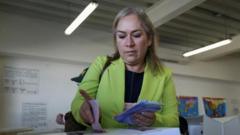Delgado's election raises questions about judicial independence amid low voter turnout in Mexico's first-ever judge elections.
Lawyer Behind El Chapo's Defense Elected as Judge in Historic Vote

Lawyer Behind El Chapo's Defense Elected as Judge in Historic Vote
Silvia Delgado, former legal representative for drug lord 'El Chapo,' secures a judicial position in controversial election.
The political landscape in Mexico shifted dramatically with the election of Silvia Delgado, a former defense attorney for the notorious drug lord Joaquín "El Chapo" Guzmán, as a local criminal judge in Ciudad Juárez. Published election results indicated Delgado garnered enough votes to clinch this significant judicial role during Mexico's groundbreaking judicial elections held on June 1st. Her election has sparked considerable debate, especially following accusations from a leading transparency organization that suggested her candidacy revealed connections to organized crime, claims she vigorously denied.
At 51 years old, Delgado was part of the legal team that defended El Chapo before his extradition to the United States in 2017, where he was later convicted of drug trafficking and is currently serving a life sentence in a federal supermax prison. In a pre-election interview, Delgado maintained that her involvement in El Chapo's defense was simply fulfilling her legal duties and rejected the idea of any conflict of interest should she be appointed as a judge.
Following the announcement of the votes, Delgado opted to hold off on comments until her victory was formally confirmed. This election marked a historic moment, being the first instance of judges—including those for the Supreme Court—being elected directly by the public. Advocates of this reform, spearheaded by the ruling Morena party, argued that it enhances democratic accountability in the judiciary. Critics, however, expressed concerns over the potential erosion of judicial independence.
Turnout for this pivotal election was notably low, with only 13% of eligible voters casting their ballots, the lowest participation recorded for any federal election in Mexico. Observers have suggested this reflects a broader disinterest among the Mexican populace toward direct elections for judicial positions. Nonetheless, President Claudia Sheinbaum described the event as a significant achievement for democracy in the country, even as skepticism about the implications of the outcome lingers.
At 51 years old, Delgado was part of the legal team that defended El Chapo before his extradition to the United States in 2017, where he was later convicted of drug trafficking and is currently serving a life sentence in a federal supermax prison. In a pre-election interview, Delgado maintained that her involvement in El Chapo's defense was simply fulfilling her legal duties and rejected the idea of any conflict of interest should she be appointed as a judge.
Following the announcement of the votes, Delgado opted to hold off on comments until her victory was formally confirmed. This election marked a historic moment, being the first instance of judges—including those for the Supreme Court—being elected directly by the public. Advocates of this reform, spearheaded by the ruling Morena party, argued that it enhances democratic accountability in the judiciary. Critics, however, expressed concerns over the potential erosion of judicial independence.
Turnout for this pivotal election was notably low, with only 13% of eligible voters casting their ballots, the lowest participation recorded for any federal election in Mexico. Observers have suggested this reflects a broader disinterest among the Mexican populace toward direct elections for judicial positions. Nonetheless, President Claudia Sheinbaum described the event as a significant achievement for democracy in the country, even as skepticism about the implications of the outcome lingers.


















